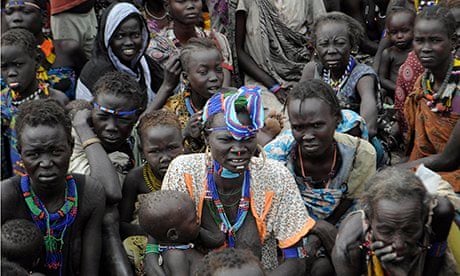Resilience is the buzzword of the moment in humanitarian circles, usually referring to the ability of an individual or institution to absorb stresses and recover from shocks. There are good reasons why resilience is in the spotlight: many emergency needs stem from chronic situations, not sudden crises.
Between 2000 and 2009, Afghanistan, the Democratic Republic of the Congo, Ethiopia, Iraq, Sudan, and the occupied Palestinian territories were among the top 10 recipients of international humanitarian assistance (pdf). By and large, the same people in the world need emergency aid, year after year.
Building communities' resilience to recurring shocks and stresses holds the promise of relieving suffering for good. It is also in line with the times – with austerity squeezing aid budgets in many wealthy countries, programmes that offer an exit strategy for humanitarian action have strong appeal and, in any case, make sense.
In many ways, people in South Sudan are among the most resilient in the world. They lived through several decades of war before a peace agreement with Sudan was signed in 2005. Between 1983 and 2005, around 2 million people died and several million were displaced (pdf). In a remarkable show of determination and perseverance, the country gained its independence in July 2011.
South Sudan's resilience is also apparent in people's everyday lives. In my work as the UN's co-ordinator for development and humanitarian action, I travel to some of the remotest parts of the country, visiting communities affected by floods and displacement.
I recently accompanied the UK's minister for Africa, Mark Simmonds, to Jonglei to listen to communities affected by violence. Though often poor and living in insecure areas, these people never strike me as victims. On the contrary, they have long-standing and often effective strategies for survival in what can be extremely inhospitable conditions. South Sudan is home to some of the largest wetlands in Africa. Moving homes and grazing grounds with the seasons and adapting to changes in the environment is a normal part of life.
So how can aid organisations help South Sudanese people become even more resilient? I see our role as threefold. First, we need to provide a safety net that catches people when their own coping mechanisms break down.
Half of South Sudan's population – about 6 million people – live below the national poverty threshold of about £10 per month. For these people, it takes little to tip into destitution. An unexpected crop pest, loss of cattle, or the illness of a family member can topple a household's ability to provide for itself.
Ensuring access to basic services – free vaccinations, clean water, proper sanitation – reduces vulnerability to these shocks and helps families maintain a minimum quality of life in the midst of shocks to their livelihoods. Giving people in need shelter, blankets and food for their children is also part of this support. Until South Sudan's state institutions grow stronger and are present across the country, this work will continue to fall largely on the shoulders of aid agencies.
The second role is to help people in a way that allows them to bounce back from adversity as quickly as possible. One of the best examples of this is to address hunger by giving families seeds and tools for farming instead of, or in the short-term together with, food assistance.
South Sudan has enormous agricultural potential and the highest number of livestock per capita in sub-Saharan Africa. Yet only 4% of arable land is cultivated, and the commercial use of cattle is much lower than in neighbouring countries. We should seize every opportunity to empower people to make the most of the country's potential and create better lives for themselves and their communities. This approach involves oxen and ploughs rather than tractors and expensive mechanised equipment. Simple, tried and tested methods will have the greatest impact.
The third way to bolster resilience is to help prevent shocks. Here aid agencies can bring expertise and experience from other countries that suffer from recurring natural disasters and have national risk management strategies in place. Between 200,000 and 300,000 people are affected by floods in South Sudan every year. This number could drop dramatically with effective mitigation measures in place, such as helping people move to higher ground, or building dykes and canals in flood zones.
This week the humanitarian community in South Sudan launches its appeal to donors for humanitarian action in 2014-2016. More than 100 aid organisations need $1.1bn for programmes to help 3.1 million people in 2014. Our appeal has three objectives: to respond to immediate life-saving needs; to build communities' resilience; and to strengthen national systems for delivering basic services.
By reinforcing our focus on capacity building, we reaffirm that caring for people in need is ultimately the role of state institutions. We will do everything we can to help those institutions assume their responsibility; recognising that humanitarian action is one component of the international community's broader support for South Sudan's journey out of fragility.
Our strategy is aligned with the concepts of the new deal for engagement in fragile states, an important framework for aid in countries recovering from crisis. The new deal is founded on the idea of national ownership and on a relationship between fragile countries and their donors based on trust and mutually agreed goals. Basing our emergency appeal on these principles is especially important as, for now, humanitarian assistance represents about half of all international aid to South Sudan.
People in South Sudan do not need lessons in resilience, but they do need the world's solidarity and support. Our job is to ensure that every dollar spent on aid makes a difference. That is best done by helping people help themselves.
Toby Lanzer is the UN development and humanitarian co-ordinator in South Sudan

Comments (…)
Sign in or create your Guardian account to join the discussion